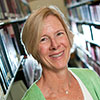This article is more than 5 years old.
Nashville skyline at sunrise
Earlier this month, I traveled to Nashville with a group of Wake Forest colleagues to attend the annual meeting of the Southern Association of Colleges and Schools – Commission on Colleges (SACS-COC). All of us have a role in writing the narratives for Wake Forest’s 2016 SACS-COC reaffirmation . The entire meeting (conference) is devoted to content that is aimed at helping schools navigate the accreditation process, as evidenced by the 164 concurrent sessions scheduled over 2 days.. The accreditation process is a complex and lengthy one that spans 2 years. First we submit a compliance certification that demonstrates we are in compliance with core requirements, comprehensive standards and federal requirements. This is submitted 15 months in advance of the scheduled reaffirmation. After it is submitted, the documentation is reviewed by an Off-Site Reaffirmation Committee and its findings on the status of compliance go to the On-Site Reaffirmation Committee. We submit a Quality Enhancement Plan (which Lauren Corbett is involved with) 4-6 weeks in advance of the on-site review. The final decision for reaffirmation comes from the Commission’s Board of Trustees. For Wake Forest, we will find out whether we are reaffirmed in December 2016. Since we are at the beginning of this long process, attending this annual meeting provided a good opportunity to hear perspectives from
- other schools who are undergoing reaffirmation or have recently completed the process,
- off-site reviewers
- on-site reviewers
- Commission staff
Of all the standards that must be complied with, Library Services are a small but important component. There are 4 standards: 2.9 (a core requirement that focuses on collections) and 3 comprehensive standards (3.8.1 (facilities), 3.8.2 (instruction), 3.8.3 (qualified staff)). In the entire lineup of sessions, only one concurrent session was devoted to these standards. Additionally, there was a group discussion on them. I went to both, confident that I would get concrete answers to any questions posed. However, I found that this was not to be. At all the sessions I attended, the theme was that standards are written broadly because every institution is unique. What works for one doesn’t necessarily work for another. The standards have to serve to work for public/private, community colleges/undergraduate schools/universities with graduate programs. So, as one presenter asked, “Does the glove fit?” Writing a narrative about compliance for your institution is all about rightness of fit. To muddy the waters even more, the perspectives offered by the two library standards presenters did not align with each other. One, an off-site reviewer, gave advice that was different from the other presenter (who is a SACS-COC Vice President).My take away from this experience was that our narratives should reflect what feels right for us. Not necessarily the kind of specificity a librarian prefers, but it’s what we have to work with!
Lest anyone who has made it this far in this posting think that I spent 2 days in Nashville and only had to attend 2 sessions, rest assured that I took advantage of other programs, many of which were assessment-focused. I went to one that talked about assessing teaching in an online environment. Often assessment takes place on the design of the course while not addressing the effectiveness of the teaching that takes place. Another presentation by an art professor described the process his department undertook to overhaul their assessment program. I liked the term he used – stealth assessment – the process faculty do from semester to semester to tweak curriculum from lessons learned the previous semester. It may not be formal, but it’s a common informal assessment activity.
Also worth mentioning (with a link) came from one of the keynoters, Cameron Evans of Microsoft. He talked about the trend of trying to personalize learning experiences and showed a Microsoft vision video to illustrate. A final recommendation comes from a session I attended by Dr. John R. Dew, Back to the Future, where he updated the audience on 16 higher education trends he had presented at SACS-COC the previous year. The original article was in The World Future Review, Winter 2012, p.7-13 (restricted access to WFU).
I’ll close with a nod to the Music City honky-tonk vibes that permeated all around the downtown Nashville area:



3 Comments on ‘SACS-COC in Nashville’
Johnny, Willie, Dolly and SACS-COC. What a mash-up! 2.9. 3.8.1, 3.8.2, and 3.8.3 are in good hands!
Beautiful skyline. I guess it makes some sense that standards such as SACS wouldn’t be “one size fits all” since colleges, and their missions are all so different.
personalizing learning experiences does go against the trend for standardization of assessment. hmmmm…..lots to think about.